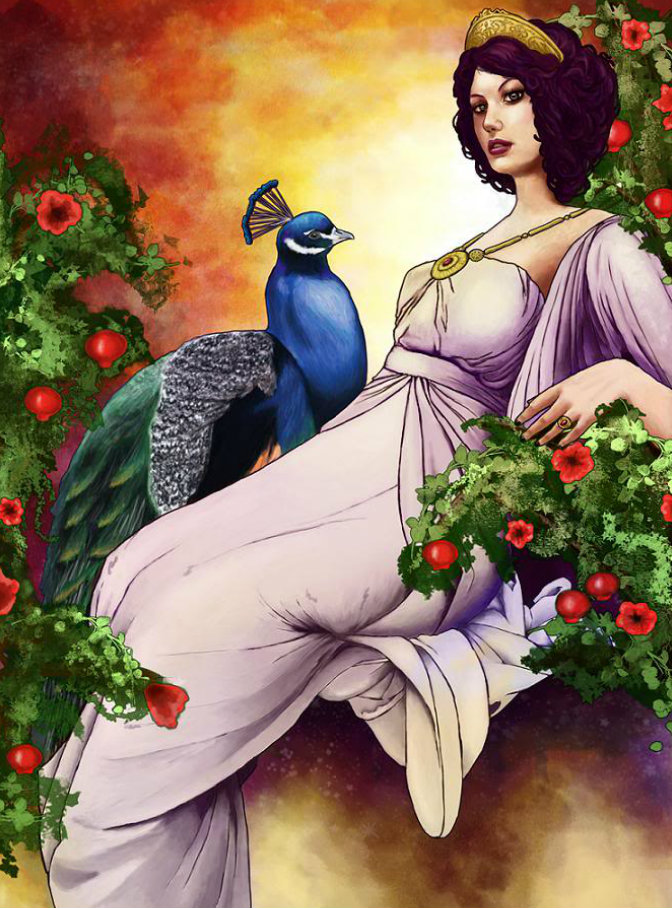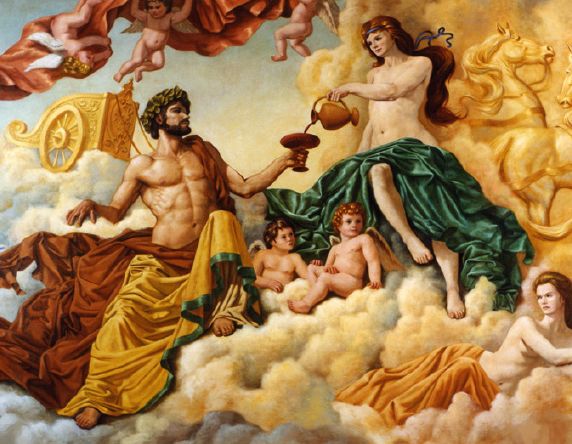Hey guys! Given our proximity to Valentine's Day, I thought that I would interrupt our series on Egyptian mythology to take a look at the origins of the holiday.
To accomplish that, we'll have to take a look at several different things. An ancient Roman festival called Lupercalia (a reference to which appears in Shakespeare's works), the story of Saint Valentine, the holidays of Candlemas/Groundhog Day, and the modern celebration distilled from all of those shall all be discussed in this post...along with several gods and goddesses from Roman mythology.
Interested? Awesome! Let's get started, then.
Lupercalia
Blood is crimson
Milk is white
Central to a holiday
Long out of sight.
Sorry. I tried, alright? Poetry and I are not close associates.
Alright! So, Lupercalia. Lupercalia was an ancient festival in Rome, celebrated around February 15th. I know I haven't begun my series on Roman mythology yet, but the celebration was closely tied to several figures from the myths. The most prominent of these are Romulus and Remus.
I'll talk more about the duo when I do a post about them, but let me give you the basics. Romulus and Remus were born the children of Mars, god of war, and a woman who was sworn to be a virgin. These twins were the rightful heir to the throne. Enraged by their birth, the relative who had seized the throne and forced their mother to take the oaths of virginity in the first place had the babies abandoned, exposed by a river to die.
Instead, the two boys were found by a female wolf, one who had recently had pups of her own and was lactating. She suckled the boys and raised them until they were taken in by a human shepherd. The cave where she is said to have cared for them is called the Lupercal.
Romulus and Remus went on to become the founders of Rome (though one of them was killed by the other). They were exceptionally powerful, virile young men, and this aspect of their personality is glorified in the celebration of Lupercalia.
The religious rituals during the celebration of Lupercalia are quite interesting to me. At the beginning of the festival priests would gather in the Lupercal and sacrifice both a goat and a dog. Two young males would then strip down to loincloths. The blood of the goat and the dog was smeared onto their foreheads, and then wiped away by a cloth dipped in milk.
The use of the goat and the dog as the sacrificial animals interests me. The goat was associated with both virility and lust. The dog was seen as a protector of fields and herds. Lupercalia was both a fertility festival, and a festival of protection - the young men who had blood and milk both smeared across their foreheads ran around the boundary of Rome to place a circle of protection around the city.
(I feel that here I should point out the two dominant colors of the holiday so far - red and white. Both colors are often seen on modern Valentine's Day cards, but I was quite amused to find the reason behind those colors while researching for this post. As one sourcebook I have says, assuming that Valentine's Day has its origins in Lupercalia...
"If this is the case, then the red that dominates so many modern Valentine cards may have derived from the sacrificial blood of the Lupercalia."
Think of that the next time you send a card to your sweetheart!)
The sacrificial goat was used for another purpose. It was skinned, and its hide was used to make whips for both of the young men. The men would then run through the city, still clad only in loincloths, and whip everyone that they saw. These whips were called februa, and women very much wanted to be whipped, as it was believed that a lashing from the goat-skin could make them more fertile.
This practice in referenced in Shakespeare's Julius Caesar, in which Antony is advised to whip his wife during the holiday to cure her barren womb. I thought that was a very interesting reference.
A few more tidbits of information about Lupercalia, and then we'll move on:
I discussed in
a post about Greek mythology the story of Hades, Demeter, and Persephone. The same tale can be found in Roman mythology, with the names replaced as Pluto, Ceres, and Proserpina. A very brief rundown of the story is that Proserpina represents spring, while her mother Ceres is goddess of the harvest. When Proserpina is carried to the Underworld to be the bride of Pluto, Ceres mourns for her and refuses to tend to her divine duties, allowing all plant life to die - thus causing winter. Ceres wanders the earth in search of Proserpina, eventually managing to find her and return her to the earth for part of each year.
This tale is celebrated during Lupercalia, since it is a fertility festival and harvest deities are generally associated with fertility. The celebration revolved around a torchlight procession, meant to represent Ceres searching for her daughter. We'll talk a bit more about that in the next section of this post.
Lastly: Before the beginning of the festival it was common for a box to go around with the names of all of the young women. The men would each pick a name from this box, and the girl whose name they chose would be paired with them for the celebration of Lupercalia. This becomes a very important link between holidays as we move to:
Candlemas/Groundhog Day
Candlemas has its origins in the feast of Lupercalia. It is intricately tied to the procession representing Ceres' search. When Christianity and the church arrived in Rome they took issue with the pagan rituals they found in Lupercalia and sought to change them to something more appropriate to the church.
This led to the creation of Candlemas.
There is a tradition in Jewish culture that the firstborn son of a family is taken to the Temple to be dedicated to God 40 days after his birth, with a sacrificial offering taking place. After the birth of Jesus, Mary took Him to be dedicated 40 days after His birth.
Candlemas is celebrated on February 2nd - 40 days after Christmas. The celebration is marked by a procession in which the people all hold candles - replacing the torches used in Lupercalia.
(While this doesn't necessarily tie into Valentine's Day, I thought it was interesting to note that Candlemas eventually became Groundhog Day. On this day in the US a groundhog is checked upon. Whether or not it can see its shadow determines whether winter is still in swing or if spring is coming. This tradition can be found in many countries, though groundhogs are not always the animals used - sometimes they are a hedgehog, a badger, or "the Candlemas Bear". Kind of cool, right?)
You might be wondering why I'm mentioning Candlemas and Groundhog Day in a post about Valentine's Day - after all, wasn't Groundhog Day on February 2nd? Well, according to what I've read Groundhog Day was originally held around February 14th, before shenanigans occurred as the type of calendar used was changed in some parts of the world.
All of this ties together to bring us to the original reason for the post...
Valentine's Day
As is the case with so many holidays, a lot changed once the church arrived. The Christian leaders of the early part of this millennia looked at the pagan rituals of Lupercalia and were horrified by what they saw. The Pope at that time (469AD), one Pope Gelasius, decided to set aside the day of February 14th to honor a Saint who had been martyred on the same day centuries earlier. That Saint was Valentine.
There are a lot of stories attached to Valentine. He was a Christian living in Rome who refused to renounce his faith in God, and so was executed as punishment. This was enough to make him a martyr, and he was later made a saint because of it.
However, stories also say that Valentine was associated with several romantic legends. According to some he married young couples in love during a time when marriages were forbidden by the emperor (don't ask me why).
In others Valentine fell in love with a young woman who was blind. His faith allowed her sight to be restored, and before he was executed he left her a note signed "From your Valentine."
This last story particularly suits Valentine's Day, though I have no idea how accurate it is.
Regardless of his accomplishments in life, Valentine was the saint tied to February 14th. The day was declared the Feast of St. Valentine, later shortened to Valentine's Day.
The way Valentine's Day was celebrated changed throughout the centuries, but it retained many links to its earlier origins. The Lupercalia tradition of drawing names from a jar to assign sweethearts remained, though those who were drawn were now dubbed valentines.
The cards which we now call valentines actually did not appear commercially until sometime around the 1800s, though records exist of individuals creating them long before - for instance, a Duke named Charles who was imprisoned over Valentine's Day wrote poems and sent them to his wife around the holiday.
Speaking of valentines...let's complicate matters a little more and throw in some:
Roman Mythology
Now, today a lot of valentines have ties to modern pop culture. I myself gave out Star Wars valentines this holiday. In the past I've handed out Avengers ones, Harry Potter ones, Pirates of the Caribbean valentines, additional Star Wars ones...you get the picture. Tiny pieces of paper with geeky images and bad, vaguely flirtatious jokes are the norm now.
(I rest my case.)
But older valentines (and some of the classier ones, in addition to cards, that are around today), along with the thematic images still associated with the holiday, have their roots in Roman mythology. Let's take a look at two things: doves and Cupid.
Doves are also called lovebirds. These birds can be seen on many cards, balloons, and valentines around Valentine's Day. Doves mate for life, and so are considered very romantic. This is part of why they're tied to the holiday of Valentine's Day, but the other reason has to do with Roman mythology. You see, doves were considered a sacred symbol of Venus, the goddess of love, and were offered to her as sacrifices.
Speaking of Venus...the Roman goddess of love is the mother of Cupid, god of love. You can read more about Cupid in my
post about him, but suffice it to say that he was not always depicted as the chubby winged baby with a bow and arrow that now graces many a card. I've read theories that the god gained this appearance as Valentine's Day grew more commercial in order to better market to women, and that may or may not be so.
Still, a chubby baby he remains on most cards. Cupid was famous in mythology for his skills with a bow and arrow - not because he was a fantastic archer, but because of what his shots could do. Anyone struck with an arrow fired by Cupid would fall in love with the next person they saw.
This is another symbol commonly associated with Valentine's Day - that of a heart, pierced by an arrow.
(Behold! Doves, heart, and Cupid!)
I hope you all enjoyed this post! Did you enjoy your Valentine's Day? What did you think of the origins of the holiday?
I'll see you next week with a return to the myths of Egypt!
































